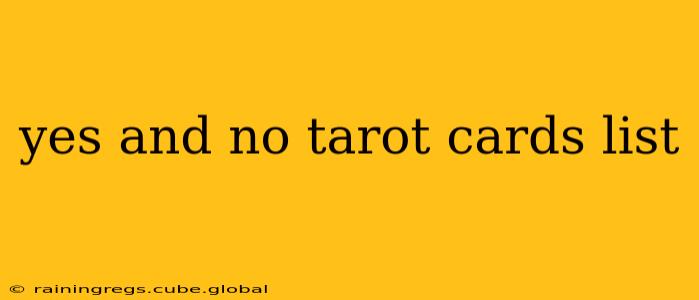The Tarot, often seen as a mystical tool for divination, can offer guidance on a wide range of questions. While it's not a simple "yes" or "no" oracle, certain cards consistently lean towards affirmative or negative interpretations, helping readers discern clearer answers. This guide explores the cards most frequently associated with definitive "yes" and "no" responses, emphasizing that context and surrounding cards significantly influence the final interpretation. Remember, the Tarot is a nuanced tool; even cards generally indicating "yes" can imply challenges or require careful consideration.
Cards Often Associated with "Yes"
Several cards strongly suggest a positive outcome, but their specific meaning depends heavily on the question's context and the surrounding cards in the spread.
-
The Sun: This card radiates positivity, joy, and success. A resounding "yes," often indicating clarity, fulfillment, and happiness associated with the query.
-
The World: Represents completion, achievement, and the culmination of a cycle. A definite "yes," signifying the successful conclusion of a project or endeavor.
-
Three of Cups: This card points towards celebration, friendship, and fulfilling connections. A "yes" related to social gatherings, relationships, and joyful events.
-
Ace of Cups: Symbolizes new beginnings, emotional fulfillment, and abundance in the emotional realm. A "yes" indicating a positive emotional development or opportunity.
-
Ten of Pentacles: Represents long-term stability, financial security, and familial harmony. A "yes" signifying lasting success and prosperity.
-
The Lovers: Often linked to harmonious relationships, significant decisions, and choices that lead to positive outcomes. A "yes" concerning partnerships or important choices.
Cards Often Associated with "No"
Similarly, some cards strongly suggest a negative or cautionary response, advising against a particular course of action. Again, context remains crucial for precise interpretation.
-
The Tower: This card indicates sudden upheaval, unexpected change, and potential destruction of existing structures. A resounding "no," suggesting a course of action is likely to bring about significant problems.
-
Five of Swords: Represents conflict, defeat, and the potential for regret. A "no" related to aggressive actions or situations marked by hostility.
-
Three of Swords: Indicates heartache, sorrow, and emotional pain. A "no" implying emotional distress or a painful outcome.
-
Ten of Swords: Symbolizes defeat, betrayal, and utter exhaustion. A very strong "no," suggesting the situation is hopeless or beyond repair.
-
The Hanged Man: Suggests surrender, sacrifice, and a need to re-evaluate a situation. A "no" indicating a need for patience and a change in perspective.
-
Eight of Pentacles: While not always negative, this card often points to an overemphasis on meticulous work and potentially neglecting other aspects. It could indicate a "no" if pursuing the question’s subject implies neglecting crucial details.
What are the most definitive "yes" and "no" cards?
There isn't a single, universally agreed-upon "yes" or "no" card. The Tarot's complexity defies such simplistic categorization. However, cards like the Sun and the Tower are frequently interpreted as strong indicators of positive and negative outcomes respectively, given the appropriate context within a spread. The final interpretation always depends on the surrounding cards and the question's nuances.
Can you get a definitive "yes" or "no" answer from the Tarot?
While some cards lean strongly towards affirmation or negation, aiming for a simple "yes" or "no" answer from the Tarot often overlooks its richness. The cards offer insights beyond a binary response, unveiling the underlying complexities and potential outcomes of a situation.
How accurate are Tarot card readings for yes/no questions?
The accuracy of a Tarot reading for yes/no questions, like any divination method, depends on various factors, including the reader's skill, the querent's clarity of intention, and the inherent ambiguity of life's possibilities. The Tarot offers guidance and insight, not predictions set in stone.
Conclusion
While specific cards often lean toward "yes" or "no" interpretations, remember that the Tarot is a sophisticated tool for self-reflection and insight, not merely a fortune-telling machine. Context, intuition, and the overall reading are crucial for accurate interpretation. Approach the cards with an open mind and a willingness to explore the nuances they reveal, allowing for a more profound understanding of yourself and the situation at hand.
